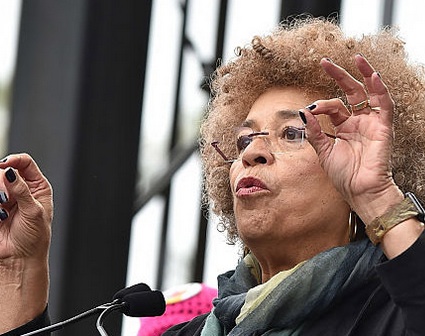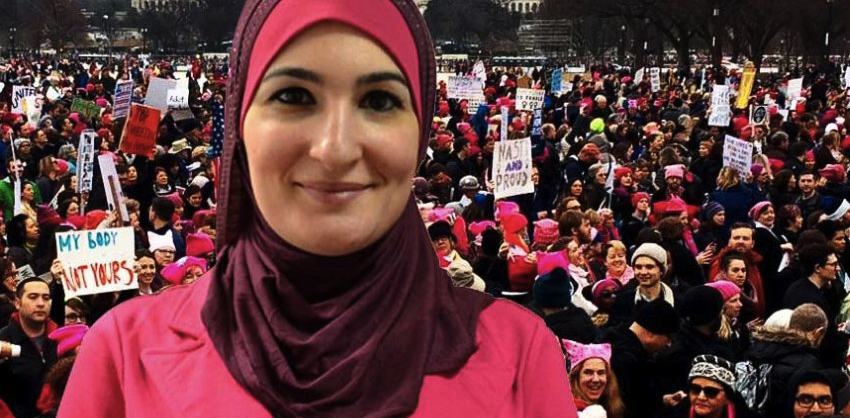The Palestine Question, which will see a number of significant anniversaries this year, has now reached the heart of the progressive, pro-democracy movement in the United States, from where it will be hard to dislodge it.
This was made completely clear during the Women’s March on Washington on January 22 (along with its hundreds of massive sister marches around the United States– and the world.)
The tone was set by Linda Sarsour (pictured above). Sarsour, the Executive Director of the Arab-American Association of New York, was one of the national co-chairs of the Washington march. In her powerful address to the marchers (Youtube) she started off by saying, “I stand before you unapologetically Muslim-American, unapologetically Palestinian-American, and unapologetically from Brooklyn, New York.”
 A later speaker was the historic African-American intellectual and activist Angela Davis (at right). In a speech that started out with a reminder of “The freedom struggles of black people that have shaped the very nature of this country’s history… ” Davis later stated unequivocally that, “Women’s rights are human rights all over the planet and that is why we say freedom and justice for Palestine.”
A later speaker was the historic African-American intellectual and activist Angela Davis (at right). In a speech that started out with a reminder of “The freedom struggles of black people that have shaped the very nature of this country’s history… ” Davis later stated unequivocally that, “Women’s rights are human rights all over the planet and that is why we say freedom and justice for Palestine.”
Mingled throughout the crowd– in Washington DC, as in many of the other cities where marches took place– were participants proudly wearing Palestinian keffiyehs or Palestinian flags.
I have now spent nearly 35 years living in the United States; and in my experience this identification of the broad, pro-democracy movement in this country with the cause of Palestinian rights is unprecedented.
For most of the first 20 years of my time here, the “progressive” movement in the United States identified far more closely with Israel than with the Palestinians. (In summer 1982, when the Israeli military was besieging and raining hellish bombs on the Palestinians and their allies in West Beirut, Jane Fonda–an icon of the U.S. “progressive” and even antiwar movement– visited Israel to help “rally” the troops, even touring some of the Israeli military’s front-line posts in occupied Lebanon.)
In those days, almost the only voices in U.S. politics that were prepared to stand up and say that perhaps the Palestinians were not all “terrorists”, and perhaps they should be entitled to some rights, were the voices of liberal Republicans.
Well, there’s no such thing as a liberal Republican any more… And meantime, the progressive movement in this country has also, very slowly, been changing. In good part, this has been due to the smart self-organizing of Palestinian Americans (like Ms. Sarsour) and their allies around the country. In part, it is due to the increasing recognition among progressive Americans (including many Jewish Americans) that Israel has now, for a long time, been moving very far away from their values. In part, it has been due to the very smart recognition by Palestinian Americans, Muslim Americans, African Americans, Hispanic Americans and others that they will all be much more effective in protecting their basic rights if they act together, rather than separately. (This is called “intersectionality.”)
Some very interesting challenges remain. Will the Democratic Party prove able to absorb and benefit from the energy of the millions of Americans who marched on January 22– or will the country’s still-small Green Party be able to grow; or will other, new parties emerge? Or, will we see the emergence of one or more strong new social movements that don’t have electoral politics at the top of their agenda?
Only the coming months and years will tell. But it is already clear that within the (deeply troubled) Democratic party leadership, the Palestine Question– or perhaps, we could say, the last vestiges of the Israel Question– is already a factor.
The Democratic Party leadership that brought us Hillary Clinton as a (failed) candidate was one that was deeply in cahoots with pro-Israel causes. Rep. Debbie Wasserman-Schultz, the chair of the DNC who had to stand down in July after Wikleaks revealed some of the shenanigans she and the DNC had engaged in to deny Bernie Sanders a victory in the Democratic primary, was a key ally for the pro-Israel forces in Washington. Now, after being held by an interim head for a while, the DNC chair is up for grabs. And though the Palestine/Israel Question is only one among the many issues at stake in this contest, it is clear that Palestine/Israel is certainly a factor in it.
The Democratic Party is not a pushover for the pro-Israel Lobby any more. If the Party leadership wants to be able to connect with and energize the massive grassroots movement that took to the streets on Saturday, it will have to grapple in a much more honest way than ever before with the matter of Palestinian rights.
Stay tuned…

